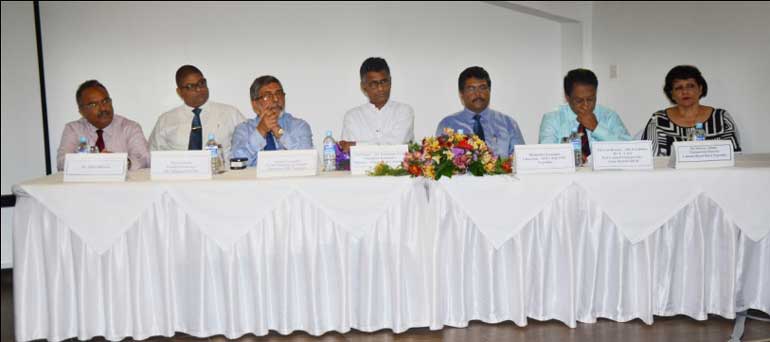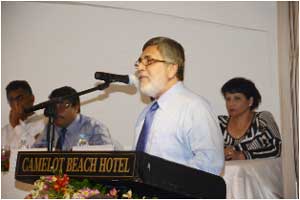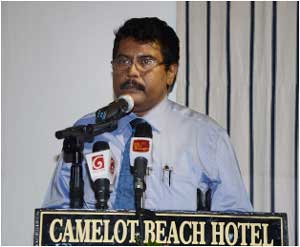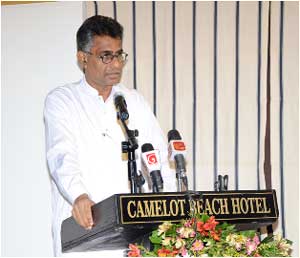Friday Feb 20, 2026
Friday Feb 20, 2026
Monday, 2 November 2015 00:00 - - {{hitsCtrl.values.hits}}

TMC Negombo invited Minister Patali Champika Ranawaka to speak at the Evening Meeting on 16 October at Camelot Beach Hotel, on a topic that is well known to him as a Cabinet Minister but less known to the public. Around 125 participants consisting of members, guests and invitees had the opportunity of listening to the Minister speaking on Megapolis and Western Development.
 He said he is indeed happy and fascinated by the endeavours made by the management community to create a forum such as The Management Club. He also was happy that TMC provides not only a place to meet and greet one another but also providing opportunities for continuous professional development, sharing experiences and networking which he said would be so useful in the discharge of their professional responsibilities. He also found it even more interesting that this forum has formed a base outside the capital city of Colombo which nevertheless represents an important area in the future Western megapolis. He then turned to the subject he was invited to speak on –
He said he is indeed happy and fascinated by the endeavours made by the management community to create a forum such as The Management Club. He also was happy that TMC provides not only a place to meet and greet one another but also providing opportunities for continuous professional development, sharing experiences and networking which he said would be so useful in the discharge of their professional responsibilities. He also found it even more interesting that this forum has formed a base outside the capital city of Colombo which nevertheless represents an important area in the future Western megapolis. He then turned to the subject he was invited to speak on –
 Megapolis and Western Development which also happens to constitute the scope of his new ministerial portfolio. He explained how the word megapolis was derived – in Greek, it has a simple meaning – ‘A great city comprising of a complex of network of cities and townships’. He said that the modern concepts as well as the commonly adopted model of megapolis is based on the premise that if cities in the adjacent regions work together, they could create a new urban form that will increase economic opportunity and global competitiveness for each individual city and for the nation as a whole. A cluster network of cities existing in a megapolis region enjoy the advantage of being able to address common concerns in the areas of transportation inclusive economic development, environment protection etc.
Megapolis and Western Development which also happens to constitute the scope of his new ministerial portfolio. He explained how the word megapolis was derived – in Greek, it has a simple meaning – ‘A great city comprising of a complex of network of cities and townships’. He said that the modern concepts as well as the commonly adopted model of megapolis is based on the premise that if cities in the adjacent regions work together, they could create a new urban form that will increase economic opportunity and global competitiveness for each individual city and for the nation as a whole. A cluster network of cities existing in a megapolis region enjoy the advantage of being able to address common concerns in the areas of transportation inclusive economic development, environment protection etc.
This is exactly the rationale behind the investments amounting to hundreds of billions of dollars made by Governments in Europe, including European Union, China and Japan that are being made in new intermodal transportation and communication links and other infrastructure.
He explained an interesting concept ‘Economic density’ and the key determinant of competitiveness and a country or a region in today’s highly competitive, globalised economic environment is just that economic density. Economic density is the value of economic activity generated within a geographical extent of 1 sq km.
 He also said in the scale of economic density, Colombo ranks well below that of Bangkok, Kuala Lumpur and several Indian cities.
He also said in the scale of economic density, Colombo ranks well below that of Bangkok, Kuala Lumpur and several Indian cities.
From the perspective of rapid economic growth, the most effective way of promoting long term growth in our country, first drive to graduate as an upper middle income country, then as a high income country is to facilitate geographical concentration and economic integration. This he said is exactly the rationale behind developing the entire western region of Sri Lanka as a single megapolis which envisages a large population estimated to be at eight million by 2030.
Smart city
He discussed various factors, benefits and concerns of environment sustainability; he spoke of the concepts of driving towards one direction that is to work towards a smart city. Explaining what a smart city is, he said smart cities are a process rather than a static outcome in which increased citizen engagement, hard infrastructure, social capital and digital technologies make cities more liveable , resilient and better able to respond to challenges.
There are over one million commuters to the city that daily suffer congestion and poor public transport. Around 65% of the 5.8 million people living in the Colombo Metropolitan Region travel outside their homes every day, while around 100,000 people from other provinces also arrive in the Western Province. ‘Chronic Congestion’ on the roads, in modern expectations is a feature of a dysfunctional city. In fact according to a recent study, what is like to happen in the transport sector by 2020, if the present ‘business as usual’ scenario is allowed to continue, while pursuing a 6.5% growth in the economy is really shocking!
Amount of fuel used in the Colombo Metropolitan region will increase from 1.4 million to 4 million litres he remarked. The transportation cost per 1 km will rise to 16-40 rupees at 2013 prices he said. While the economic resource allocation for transport will rise from Rs. 397 billion to a staggering 1,847 billion, the cost of providing mobility as a percentage of GDP will rise from 11.3 to 24.7% which is most unacceptable.
What is the strategy?
What is the strategy to arrest the increasing congestion, waste of time and fuel which now costs more than Rs. 1 billion per day! It should have, and therefore, our strategy will have, necessarily a short term as well as a long term focus. Modernising and reforming the bus system for higher quality service will be a major priority. This will improve last mile accessibility for over 40% of households without private vehicles. Estimated cost is Rs. 173 billion.
Implementing two special systems of buses, which will be known as ‘Bus Rapid Transit’ and ‘Bus Priority’ on major corridors to Colombo city, will be another measure.
This would include BRT for Galle Road up to Moratuwa and up to Kadawatha on Kandy Road, and Bus Priority for Horana Road, High Level Road, Parliament Road, Low Level and Negombo Road he opined. Electrification and modernisation of suburban railway lines namely Veyangoda to Panadura, KV Line, Negombo Line including airport and two new lines respectively from Dematagoda to Horana and from Kelaniya to Biyagama has been identified as another priority.
Commencing a rail based ICD facility with dedicated connections to the Port has been identified, whilst the possibility of combining expressways traces for developing electrified railways on the Central Expressway up to Veyangoda , and from Dematagoda to Malabe , as well as accommodating the Electric Railway line in the Central Express way up to Veyangoda, will be explored he said . This he said will result in doubling the number of passengers travelling by train to Colombo, with 30-40% of peak loads carried by rail. Traffic Demand Management and Electronic Road Pricing will be done in parallel so that the road space can be managed to ensure ease of congestion.
As some immediate measure, transport demand management measures that include carefully designed measures interventions which would reduce unnecessary travel, change time and mode of travel aimed at reducing congestion will be introduced as we go on! Another short term measure would be the improvement of bus operations across the province by improving scheduling, limiting overcrowding and intense competition by re-planning the operations on major corridors and improving feeder services , extending service hours, introducing new services, starting long distance operations from peripheral towns such as Negombo, Kadawatha, Moratuwa and Kottawa where modern transport interchanges should be set up – these are all strategies and measure that are considered .
Pettah will be developed as a multi modal transport hub. Terminating long journey busses at peripheral towns such as 18th Post in Negombo Road, Kadawatha, Kottawa and Moratuwa has been identified as another short term measure. Road Network within the Province will be improved especially creating inner by pass roads to Colombo City such as extending Marine Drive, Extending Baseline Road and connecting short links to improve the network. Also the Government intend to embark on aggressive development of ICT into Government and Private Sector Transport Establishments and operations, recognising e-documents for official purposes, enabling e-commerce.
Another area that he touched upon was elimination of slums to make Western Megapolis a city free of slums and shanties. There is an estimated 70,000 families living in slums and shanties in Colombo built on almost anywhere from railway reservations to petroleum transportation pine lines and known to be crime infested and poverty ridden.
While elimination of those slums poses a major development challenge, it is the guiding principle in this regard that effective re settlement needs a systematic and comprehensive process which addresses the associated socio cultural and economic issues rather than mere shifting of physical dwelling.
He finally thanked the Management Club for the invitation and wished everyone well in all their future endeavours.